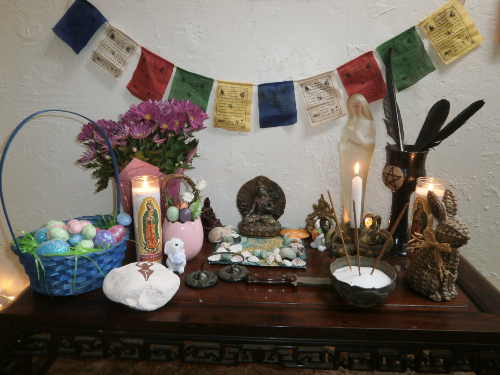
I have a friend who is an atheist Tarot card reader and it tickles me no end. I like to rag on her a bit and ask her, “Who do you think is answering your questions when you do a reading? Maybe atheist angels or agnostic spirit guides?”
Which generally earns me a dirty look or a shrug. She reads Tarot cards. She’s an atheist. It’s not up for discussion.
Now, she’s kind of caught between a rock and a hard place. The rock is that she was reading Tarot cards for many years before she became an atheist, so she knows that they actually work. When you sit down with a deck of cards and do a reading, you get answers and the answers are generally (not always) right on.
The hard place is that she went through a series of very painful life experiences that led her to conclude that there’s no God and that religion is nothing more than superstitious nonsense. That conclusion wasn’t arrived at in a frivolous manner because she was genuinely suffering in her life, she prayed for help, and nothing much happened.
It’s a pretty simple equation, right? We’re told that there’s some sort of a God-person out there, that he loves us, and that if we’re in trouble he’ll come zooming in and rescue us. So, if we do our part by (a) getting in trouble and (b) praying for help and the God-person doesn’t do his part by (c) zooming in and rescuing us, then it’s logical to conclude that the God-person either doesn’t exist or else he’s pretty useless.
I’m actually very sympathetic with my friend, the atheist Tarot reader, because I had a similar experience when I was in my mid-forties. My father had just killed himself, I lost my job and had to declare bankruptcy, my house was repossessed, and my mother developed Alzheimer’s Disease.
All of this happened within a one year span of time. My life went from being perfectly normal to being a total shit-burger in the wink of an eye. I was so chewed up by life that I had to look up to see the bottom and if it weren’t for bad luck, “I wouldn’t have had no luck at all.” Life had chewed me up, spit me out, and then stomped on me with hob-nail boots to be sure I’d stay on the ground.
I was living in Texas at the time and there’s a fundamentalist christian under every rock and behind every cactus in Texas. It was probably inevitable, then, that one of them said, “Dan, you just need to get down on your knees and pray to Jesus for help.” And I did. I was raised up in the catholic church, so the concept of praying to Jesus wasn’t exactly foreign to me and I thought, “Well, shit . . . what do I have to lose?” Nothing.
So I commenced praying and I prayed and prayed and prayed and asked Jesus to help me in my misery and travails and – SHAZAM! – nothing happened. No heavenly hosts of angels appeared, Jesus didn’t invite me for a walk in the garden and no one anointed my fevered brow with soothing oils. I continued to be royally fucked.
But, unlike my friend, the atheist Tarot reader, I didn’t throw my hands in the air and declare that God is dead and it’s just a cold, hard universe. Instead, I analyzed my situation and thought, “Well, I’m in trouble, I prayed to the God-person to come zooming in and help me, and nothing happened. Obviously, I have a defective God-person. He’s not working, so I’ll just send him back. I need to find a God-person who can get the job done.”
I did a lot of research on Gods and Goddesses and finally settled on Hecate’, the Goddess of the Cross Roads. She seemed like a good fit because I was definitely at a cross roads in my life and I needed to know which way to turn. I prayed and prayed and prayed and asked Hecate’ to help me in my misery and travails and – SHAZAM! – something happened.
In fact, quite a bit happened, just like magic. I met a woman on line, fell in love with her, moved to California and we lived together for 19 years. My life went from being an absolute shit-burger to being wonder-full in the wink of an eye.
Now, I’m not writing all of this as some sort of an anti-Jesus screed or to praise the wonders of Hecate’. I know a few christians who swear up and down that Jesus answers their prayers and they seem like nice, honest people. Maybe they got a Jesus model that wasn’t defective and he sort of works if they don’t take too close a look at him. Maybe Jesus was just a bad fit for me – could be that he doesn’t like my haircut or tie dyed shirts. I don’t know. I just know he didn’t work.
Which leads me back to my friend, the atheist Tarot reader. Like me, she tried praying to her God-person and nothing happened, nothing got better. She quite logically realized he was a defective model and sent him back. Fortunately, she was still able to hang on to her Tarot cards and say, “These DO work, so I’m not sending them back.”
The point being that we have a sort of a pragmatic, mostly unspoken, contract with our God-persons. It’s something along the lines of, “Okay, God-person, we’ll pray to you and we’ll build all of these very grandiose temple-houses for you to live in and we’ll pay the salaries of your priest-persons. You, on the other hand, will help us, console us, give us guidance, and zoom in to help us when we’re in trouble.”
Unfortunately, humans have a long history of making excuses for their God-persons. In many instances, it’s as if the God-person is on vacation when we’re in trouble, or perhaps he has Attention Deficit Disorder and it just slips his mind that we’re hanging off the edge of a cliff holding on to a single branch. In the worst instances, the God-person seems to behave like some sort of a deranged sadist who LIKES wrecking people’s lives and we just pray that maybe he won’t notice us while he’s in a bad mood.
In those instances, it’s perfectly acceptable to just say, “Okay, God-person – I held up my end of the bargain and you didn’t hold up yours. It’s been sweet, but I think we both know this isn’t working out.”
And it’s also perfectly acceptable to find another God-person. Just because this relationship is ending, it doesn’t mean that we can’t have another relationship. There’s no reason to accept the christian line that there’s only ONE God-person and that we mustn’t ever be unfaithful to him, even when he’s being unfaithful to us. What a narcissist!
It’s actually a great big universe out there and there are plenty of God-persons to choose from. If we’re stone-cold poor, for instance, we might want to talk to Lakshmi, the Goddess of Abundance. If we’re facing insurmountable obstacles, Ganesh specializes in removing them. If we’re in need of healing, talk to Tara. If we have no love in your lives, pray to Quan Yin.
I think that you’ll find that most God-persons are actually quite nice entities. For the most part, they seem to have healthy boundaries. They don’t follow you around and spy on what you’re doing. They don’t have temper fits and throw you out of the garden just because you ate an apple. They seem to have a lot of unconditional love and won’t ask you to sacrifice your first born son. And they actually work.
My e-book, “Just the Tarot,” a practical guide to reading Tarot cards, is still available on Amazon for less than you’d pay for a small order of jalapeño poppers and will last a lot longer.










